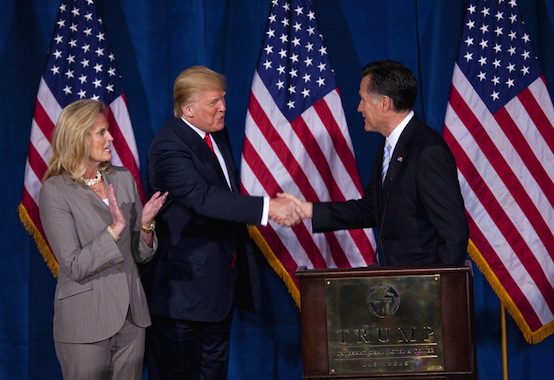Better Policies Romney Could Adopt If He Weren’t Romney

Last week, Ross Douthat proposed one way that Romney could distinguish himself for the general election:
Here’s a for instance: The American Enterprise Institute’s Jim Pethokoukis has been writing a lot lately about banking reform, and the free-market case for trying to shrink or break up the nation’s biggest banks. This is an issue area where the Obama White House’s own policies would seem to be vulnerable to a populist critique, and a place where Romney would seem to have a golden opportunity to put some distance between himself and the Gordon Gekko caricature that his opponent is intent on sketching. But the Romney campaign’s attitude, per Pethokoukis, is that taking up the cause of banking reform “would be at cross-purposes with its deregulation message.” Which is a reasonable enough point, if there were clear evidence that the deregulation message is a big general election winner. But it’s just as likely that swing voters — especially downscale, disillusioned swing voters — are waiting to hear something from Romney that suggests that he doesn’t just think deregulation and tax cuts are all the post-crash American economy needs.
That’s not a bad suggestion, but like Luigi Zingales’ earlier appeal to Romney to run a pro-market rather than pro-business campaign it is bound to fall on deaf ears. For one thing, Romney is very much a pro-business candidate (in Zingales’ negative sense) and not one terribly interested in policies that would try to reduce or limit concentrated wealth or to oppose collusion between government and corporations.
He is one of the worst conceivable messengers for a populist message around. If he were to make such a proposal now, it would be dismissed as one more implausible reinvention of himself. It may be that he genuinely believes that deregulation and tax cuts are a cure-all economic agenda, or it may be that he assumes that this is what he thinks he’s supposed to believe. Either way, Romney is no more likely to call for breaking up the banks than he is likely to abandon Bush-era foreign policy. Would he be right to do these things? Yes. Would it prove that Romney is capable of doing something other than campaigning as a cookie-cutter Republican nominee? Of course. Those are the other main reasons it is never going to happen.
Charles Kesler’s recent suggestion that Romney distance himself from Bush-era wars is a good one that will likewise never come to pass:
Why would Romney want to resubscribe to that? Here too he has an opportunity to separate himself from recent excesses while endorsing the traditional aim of conservative or Reaganite foreign policy: making the world safe for American democracy.
Why indeed? The trouble is that Romney already has resubscribed. He could separate himself from the failures of the Bush era, but that would involve repudiating the views of his own advisers and the record of the Bush administration for which so many of them worked. After five years of pandering to national security hawks as much as he possibly could, he would have absolutely no credibility to propose a less aggressive and ambitious foreign policy than the one he has been promoting.
Incidentally, I don’t quite know what Kesler means by “making the world safe for American democracy.” It’s a strange Wilsonian formulation that seems to rely on the fantasy of Bush’s Second Inaugural that American liberty depends on the flourishing of liberty around the world. There’s no hint of what this would mean in practice, but it doesn’t appear to be the traditional aim of “conservative or Reaganite” foreign policy.
Comments